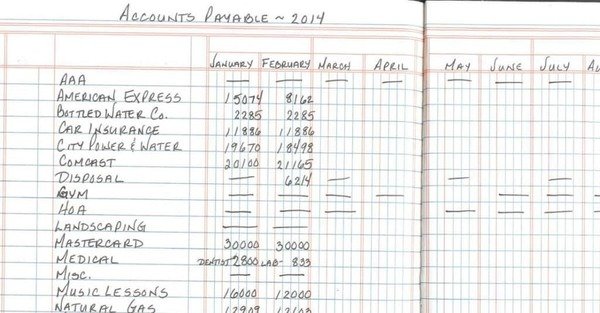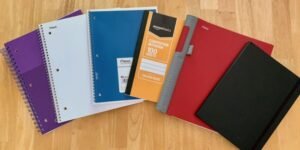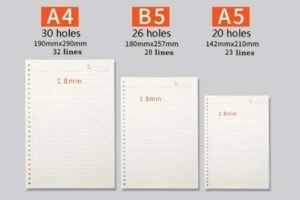
Are you staring at a new campus notebook, unsure how to make it your best study tool? Many students get notebooks but don't use them well. This can lead to messy notes and lost information. With a few strategies, your campus notebook can become key to your success.
To best use your campus notebook, organize it by subject, take clear and concise notes during lectures, and review your notes regularly. This helps you understand and remember information better for exams and assignments.
A campus notebook is more than just a place for random scribbles. It’s a system for learning. When you dedicate sections to different subjects, maybe using dividers, you create an organized library of your coursework. This makes finding specific information much easier when you're studying. Think about using different colored pens for key terms or questions. This visual separation can really boost your recall. At NotebookRing®, we often see students succeed when they treat their notebooks like a personalized textbook they are creating throughout the semester.
The way you take notes matters too. Instead of trying to write every word, focus on main ideas, keywords, and questions you have. Some people like the Cornell method, others prefer outlining or mind maps. The key is finding what works for you. And remember, we can customize inner pages with various formats like horizontal lines, grids, or dots to support your preferred note-taking style1. Our 80-120g acid-free paper ensures your notes won't bleed through, keeping them neat.
How Do I Use a Columnar Notebook Effectively?
So, you've got a columnar notebook2, maybe for a business class, accounting, or just personal budgeting3. Wondering how to make the most of those neat rows and columns? It can seem a bit rigid at first.
You use a columnar notebook to organize data into specific categories across columns. This allows for easy tracking, comparison, and analysis of numerical or itemized information, perfect for budgets, logs, or financial records.

Columnar notebooks are fantastic tools for bringing structure to data that needs to be itemized and often, calculated. They are designed for clarity. The vertical columns allow you to assign specific categories, and each row represents a single entry or transaction. This format is invaluable whether you're a student tracking project expenses, a small business owner managing inventory, or someone trying to get a handle on personal finances.
Setting Up Your Columnar Notebook
Before you dive in, a little planning goes a long way.
- Define Your Columns: Decide what information each column will hold. Common examples include:
- Date
- Description/Item
- Category (e.g., Income, Expense, Type of Expense)
- Debit (Money Out)
- Credit (Money In)
- Balance
- Quantity
- Notes
At NotebookRing®, we can even customize notebooks with pre-printed headers for specific needs, or a certain number of columns per page.
- Title Your Page: Give each page or section a clear title, like "January 2024 Budget" or "Project Alpha - Material Costs."
- Number Your Pages: If not pre-printed, consider numbering pages for easy reference, especially if you plan to create an index. Our notebooks can include page numbering.
Common Use Cases for Columnar Notebooks
Columnar notebooks are versatile. Here are a few ways people use them:
-
Personal Budgeting:
This is a classic. Track your income and expenses.Date Description Category Income ($) Expense ($) Balance ($) 01/10/2024 Paycheck Income 1500.00 1500.00 02/10/2024 Rent Housing 600.00 900.00 03/10/2024 Groceries Food 75.50 824.50 05/10/2024 Freelance Work Income 200.00 1024.50 -
Small Business Accounting:
Keep track of sales, purchases, and expenses. For businesses, our robust binding and quality paper ensure these important records last.Date Transaction ID Customer/Vendor Description Sales ($) Purchases ($) GST/VAT ($) 10/10/2024 INV-001 ABC Corp Product Sale 500.00 25.00 11/10/2024 PO-002 XYZ Supplies Office Stationery 50.00 2.50 -
Project Management:
Log tasks, deadlines, resources, or hours spent. This is helpful for students in group projects or professionals.Task ID Description Assigned To Due Date Status Hours Logged P1-01 Initial Research Sarah M. 15/10/2024 In Progress 8 P1-02 Draft Outline James W. 20/10/2024 Pending 0 P1-03 Design Mockups Yuki N. 22/10/2024 Pending 0 -
Inventory Tracking:
Monitor stock levels, especially useful for clubs selling merchandise or small online stores. -
Data Logging:
For science experiments, field notes, or any situation where you need to record structured observations. Our FSC™ certified paper options are great for environmentally conscious projects.
Tips for Effective Use
- Be Consistent: Make entries regularly. Don't let things pile up.
- Use Pencil for Calculations: At least initially, until you're sure of the figures.
- Clear Headings: Label your columns clearly. If they are very specific, write a key at the front of the notebook.
- Totals and Summaries: Periodically total your columns (e.g., at the end of a page or month).
- Color-Coding (Optional): Use different colored pens for different types of entries (e.g., red for expenses, green for income) if it helps you.
- Choose the Right Size: A larger columnar pad might be better for complex accounting, while a smaller notebook could be fine for personal budgets or simple logs. We offer various sizes like A5, B6, or even custom dimensions.
Using a columnar notebook might seem old-fashioned with all the apps available, but the physical act of writing can improve retention and understanding of the data. Plus, you're not reliant on battery life or software updates! It's a reliable tool that, when used well, brings immense clarity to complex information.
Conclusion
Campus notebooks, especially specialized ones like columnar pads, are powerful tools for organization and learning. With the right approach, they can really help you stay on top of your studies and manage information effectively.
-
Understanding various note-taking styles can help you choose the best method for your learning, enhancing retention and comprehension of information. ↩
-
Explore this resource to discover expert tips and techniques for maximizing the potential of your columnar notebook, ensuring organized and efficient data management. ↩
-
This resource will provide you with practical strategies and templates for tracking your finances, making budgeting easier and more effective. ↩





